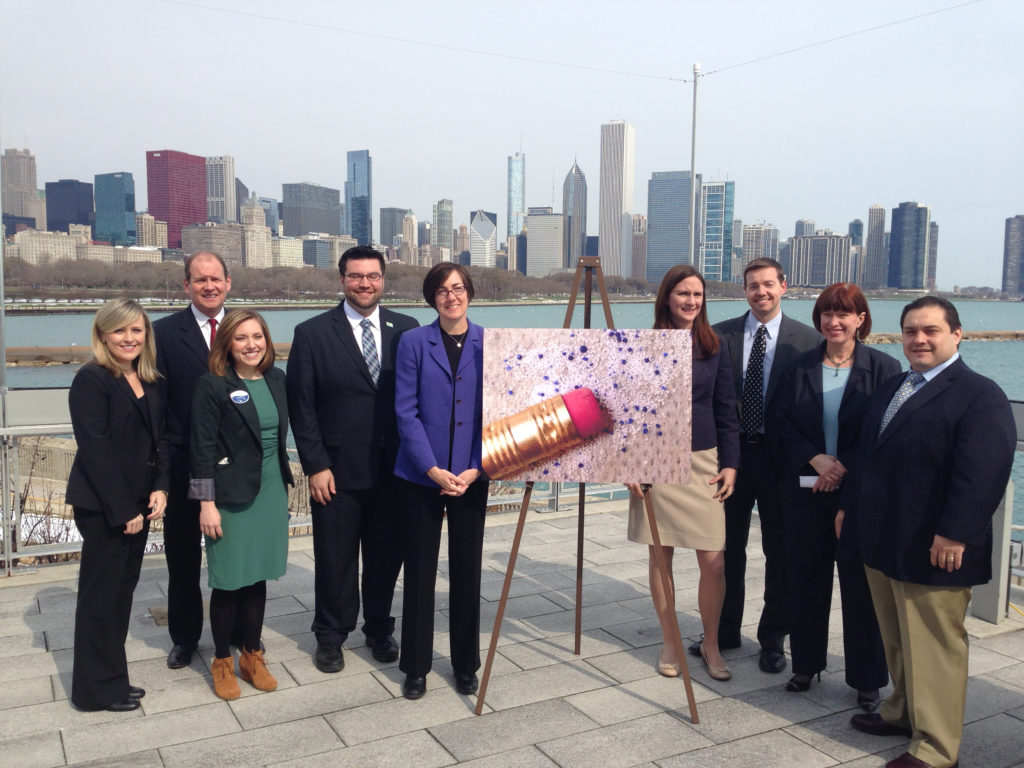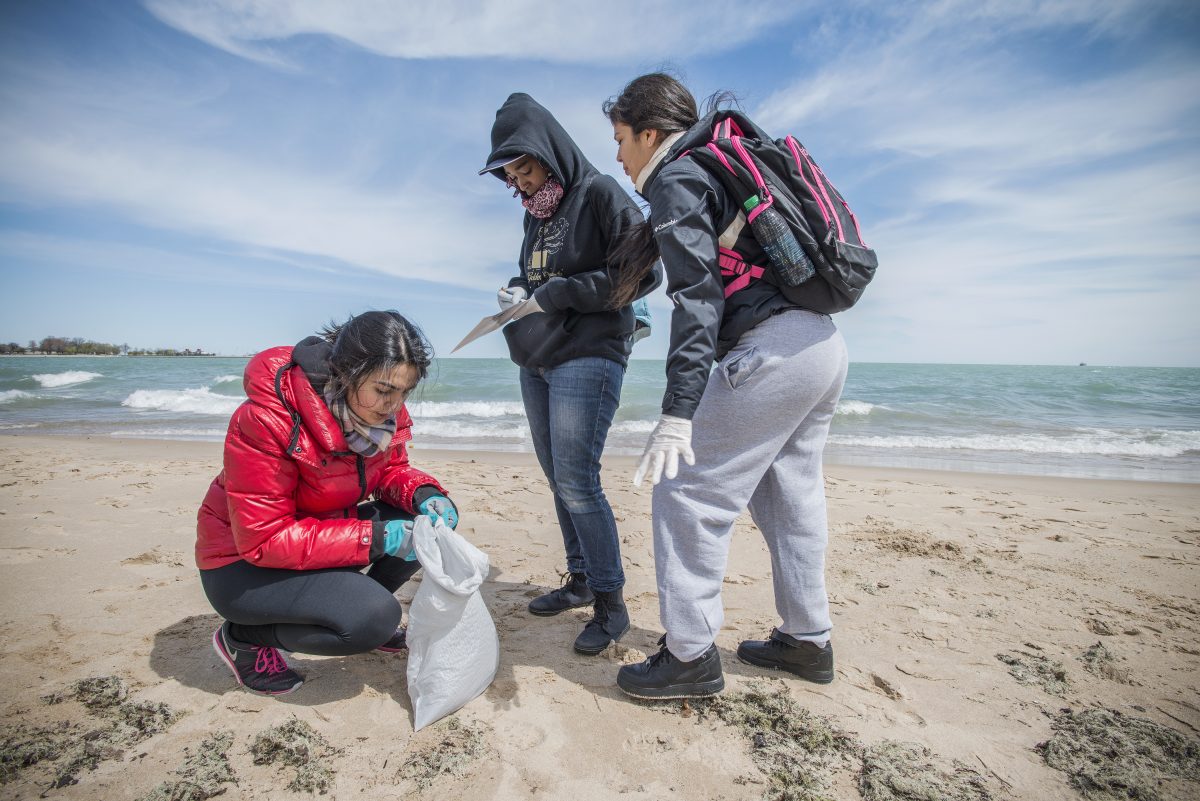Plastic pollution is ubiquitous in the Great Lakes and the world’s oceans. Tiny plastic particles have been found in everything from drinking water to beer, according to researchers in the U.S. and around the world.

Adopt-a-Beach volunteers witness the massive volume of plastic pollution first-hand at every cleanup event around the lakes. More than 80% of the litter they pick up each year is made either partially or fully of plastic — from cigarette butts to plastic bottles.
Yet tiny plastic microbeads are one type of plastic pollution that Adopt-a-Beach volunteers are powerless to pick up. Advocates are celebrating a big victory in 2018, with the upcoming implementation of a federal ban on personal care products containing these plastic microbeads.
Microbead Menace: Tiny Plastic Particles Used in Personal Care Products Threaten the Lakes
Microbeads are tiny plastic particles used as an abrasive in many personal care products, such as facial scrubs, soaps, and shampoos. When we use products containing microbeads, the tiny plastic pieces don’t dissolve. Instead, they are rinsed down the drain. Because of their small size and buoyancy, microbeads escape treatment by sewage plants and end up in our rivers and lakes.
Once in the water, microbeads can absorb toxic chemicals commonly found in the water. And they can be mistaken for food by small fish and wildlife. Studies have shown that fish and wildlife of all sizes consume plastic. The research raises serious concerns about the impacts of microbeads on aquatic life.
You Spoke Out, Manufacturers and Elected Officials Listened

When research released in 2013 showed the widespread presence of plastic microbeads in the waters of all five Great Lakes, tens of thousands of people around the Great Lakes region spoke out, calling for change.
Natural alternatives to plastic microbeads exist, such as ground almonds, oatmeal and pumice. Phasing out the use of these tiny plastic pieces was a common sense step to protect the Great Lakes. Over the following two years, you joined us to call on manufacturers and elected officials to ban plastic microbeads.
Illinois was the first state to take on the issue. The Alliance for the Great Lakes, Illinois Environmental Council, and other environmental groups teamed up to raise public awareness and promote state legislation to address the issue. And, in 2014, the Illinois state legislature passed a bill that phased out the manufacture and sale of personal care products containing plastic microbeads.
Illinois’ action led the way in a national movement, as state after state stepped up on the issue. Throughout the Great Lakes region, similar bans on plastic microbeads were passed in Indiana, Wisconsin, and several counties in New York, and were introduced in the statehouses of Michigan and New York.
Responding to public pressure, companies acted too. Many leading personal care product manufacturers — including Procter & Gamble, Unilever, Colgate-Palmolive, Johnson & Johnson, The Body Shop, and L’Oreal — committed to voluntarily phasing out the use of microbeads in their products.
Ultimately, the U.S. Congress took action by passing federal legislation which was signed into law in December 2015. The law took a phased approach to banning these products, first outlawing the manufacture and then the sale of personal care products containing plastic microbeads. The national ban on manufacturing these products went into effect on July 1, 2017. And now, the final phase — a national ban on the sale of these products — will go into effect on July 1, 2018.
Canada also took notice and adopted a federal ban, ensuring the Great Lakes are fully protected from plastic microbeads. The Canadian ban also goes into effect in 2018, phasing out the manufacture of personal care products with plastic microbeads by January 1, 2018 and the sale by July 1, 2018.
Keeping Up the Momentum In the Fight Against Plastic Pollution
The microbead victory is an important step in addressing plastic pollution, but it’s only one piece of the puzzle. Plastic pollution comes from a wide variety of sources. And unfortunately, it never really goes away. Plastic breaks down into smaller and smaller pieces — into shards, films, and other particles — that are difficult to detect but have a seriously negative collective impact on the Great Lakes.
The good news is that we have the power to change that. We know that when we come together, we can achieve big things.

Just like we ended the manufacture and sale of microbeads, we can take steps to stop other forms of plastic pollution from entering our Great Lakes. There are lots of ways to have an impact. For example, every year, more than 15,000 Adopt-a-Beach volunteers clean up local beaches. Last year, they removed 18 tons of trash, primarily consisting of plastic. By joining Adopt-a-Beach, you can be part of this 20-ton effort too.
Getting to the Root of the Problem: Pass On Plastic in the New Year
Picking up plastic litter from our beaches stops it from ending up in — and breaking down in — the Great Lakes. But we can do more to stop plastic pollution at its source. Single-use plastic items like plastic bags, water bottles and wrapping are a major culprit. If we don’t use it, it can’t end up in our water. So every time you pass on plastic, you have an impact.
Start the new year off right, and make a personal resolution to reduce your own use of plastic products. Take the Plastic-Free Great Lakes Pledge today.
